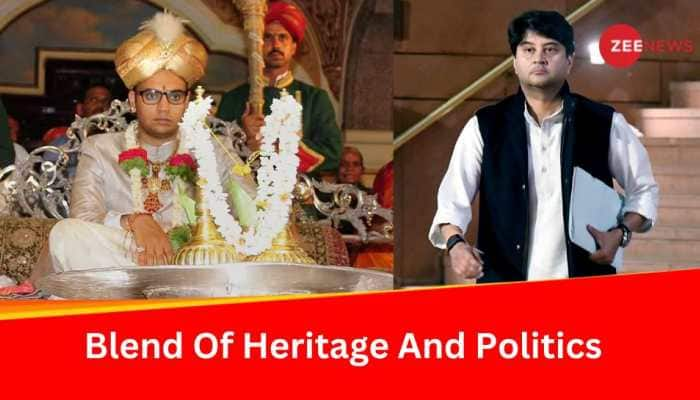`Rahul Gandhi is not doing real service to common man`
Son of former PM late Chandra Shekhar and an MP, Neeraj Shekhar shrugs off Rahul Gandhi`s service to common people.
Trending Photos
)
 Son of former prime minister late Chandra Shekhar, Neeraj Shekhar represents his father’s constituency, Ballia. A firm believer in his father’s socialistic and Gandhian ideologies, his political ambition involves a vision for his constituency’s overall development and carving out a cult image for himself. In a freewheeling chat with Arun Chaubey of Zeenews.com, he shares his views on development, his father and several other issues. Excerpts:
Q: How do you feel about inheriting the legacy of late Chandrashekharji in politics? Do you feel comfortable or duty bound to do certain things that would make a separate identity for you?
A: Being his son and inheriting the legacy of a leader, who was Socialist and a true follower of Gandhian ideology, I take it as a responsibility to do whatever I can do in the service of people, especially of my constituency. Although there are several allegations against my father that he amassed wealth and landed property, I know what he was and how he ensured that none of his sons is formally declared inheritors of his political legacy.
In true Gandhian spirit, he undertook padyatras in the eighties to understand the plight of poor people and work for their uplift. Following in his footsteps, if I’m able to do a little at least for the districts of Ballia and Ghazipur, it would be my honest service towards the political legacy that I have inherited.
Q: Why did you merge your father’s party Samajwadi Janata Party with Samajwadi Party? Was it a political compulsion?
A: Yes, it was a political compulsion. Since I had to fight election and that too against many odds, it was a political necessity for me to merge the SJP with the Samajwadi Party. In the caste-ridden politics of Uttar Pradesh, to serve my political ambition, I found that the SP was a party which suited me best.
Q: But do you find yourself comfortable with the brand of politics SP practices?
A: In fact, I joined Samajwadi Party because of Mulayam Singhji, whom I know since I developed political interest. He was one of the closest persons to my father and he used to visit him often, therefore I also had a close affinity with him. There are certain things which one may not agree with, but you can see every political party has its positives and negatives. As far I am concerned, I know that Mulayam Singhji is basically a Socialist, and his concern is still for the common people.
Q: Like your father, who had friends and admirers cutting across party-lines, how do you maintain relations or make special efforts for them?
A: Yes, my father had that kind of stature that he enjoyed friendship cutting across party lines. Since I’m his son and very much in politics now, I get the aashirvaad(blessing) of several senior leaders from different parties. I have friends in parties like Congress, BJP, RJD and even in the BSP, and I also take pride in that because ideological differences should not come in the path of personal relationships.
Q: If we talk about your constituency, Ballia, which is one of the poorest districts of eastern UP, what is your vision as far as its development goes?
A: Since Ballia is one of the poorest districts in eastern UP, in the last session of Parliament when a package for Bundelkhand was being discussed, I along other MPs of Ghazipur and Chandauli made an effort to get a special package for the districts of Purvanchal also. Due to the lack of employment opportunities, the youth of that region are disillusioned and therefore the need of the hour is to create maximum job opportunities in the eastern districts of Uttar Pradesh.
Q: Why did Ballia remain backward despite being represented by the towering leadership of your father, who also became Prime Minister? He failed to establish even a single industry in that region…
A: Yes, he did face this one criticism as a leader but very honestly accepted it as well. In his vision of development, he earlier thought that if the whole nation is developed it would filter down to backward regions also, but it did not happen. That is why during the 2004 election, wherever he visited, he said ‘sorry’ for his failure to deliver. He was a person who was always ready to apologise if he felt that he had failed to keep his promise.
Because of this feeling, when Mr Vajpayee was the Prime Minister, he invited him to Ballia and urged him to announce a special package. After that, the NDA government was out of power and his health also started deteriorating and he failed to concentrate on development work.
Besides, there are certain local reasons also, like people are not ready to spare their land if there is an effort to establish some new projects, but still I’m trying to do whatever I can do on my part.
Q: How do you think the past glory of Ballia can be restored? The area is credited to have remained independent for 14 days during 1942…
A: Ballia has a glorious past. During 1857, Mangal Pandey was the first person to wage a war against the imperialist British regime, and in 1942, under the leadership of Chitu Pandey, it remained independent for 14 days. I always wish to work as much as I can to make it a model constituency, which would be an envy of others.
Q: This is your second term from the same constituency. Can you mention any one work that gives you satisfaction of being able to do something for those whom you represent in Parliament?
A: Victory for me in the first term was certainly on the sympathy wave after my father’s demise, but in general election 2009 I faced the real test. I take pride in saying that in the regions which generally were against me, as per the political arithmetic, I got more votes. This concretised my faith in people and my thinking that if I work honestly, they would certainly vote for me.
As far as my work is concerned, I come from a party which neither has its government in the state nor in the Centre, therefore, I have my limitations. However, I can say that during floods in Doaba region I was with the people when they were confronting nature’s fury and did whatever I could do, besides helping about 100 people in treatment of severe ailments.
Q: Since River Ganges is the lifeline in a greater part of Ballia, how would you want to associate yourself with restoring the pristine glory of the sacred river?
A: For us Ganga is the most sacrosanct river and in Ballia, no doubt, it’s the lifeline of the region. But by the time it reaches Ballia, its condition has worsened and, therefore, those who belong to the region of its origin are more responsible for its poor condition. In the last session of Parliament, when Murli Manohar Joshi raised the issue of Ganga, I fully agreed with him and even spoke to him in person to do something for saving this most sacred river.
Q: As a youth leader, how do you rate the image of Rahul Gandhi which has been showcased and built by the Congress Party as a ‘Brand’? How do you want to see yourself among the emerging youth leadership?
A: Whatever Rahul Gandhi is doing is not real service to the common people. His visits are planned in a way so as to get more media attention and to project his image of being a pro-poor and pro-people leader. As far as my thoughts are concerned, I would rather concentrate on work with limited resources i.e. MPLAD funds, but with an aim that whatever work I do, it should be real and related to the uplift of poor people.
Q: What’s your memory of your father as a Prime Minister and as a mass leader?
A: Since my childhood, I saw my father surrounded by a lot of people. When I was growing up, he never tried to groom us to fit into his political shoes in the sense of any dynastic politics. He rather made us understand that he would not promote us; rather we would have to carve out our own path.
When he became the Prime Minister, I remember one episode when there was a riot like situation in Old Delhi and the late Imam Bukhari’s statements had vitiated the atmosphere, my father visited the area and cautioned him, warning that the law would take its own course. That incident was very significant because he clearly told him to follow only religious business and not meddle with politics.
Son of former prime minister late Chandra Shekhar, Neeraj Shekhar represents his father’s constituency, Ballia. A firm believer in his father’s socialistic and Gandhian ideologies, his political ambition involves a vision for his constituency’s overall development and carving out a cult image for himself. In a freewheeling chat with Arun Chaubey of Zeenews.com, he shares his views on development, his father and several other issues. Excerpts:
Q: How do you feel about inheriting the legacy of late Chandrashekharji in politics? Do you feel comfortable or duty bound to do certain things that would make a separate identity for you?
A: Being his son and inheriting the legacy of a leader, who was Socialist and a true follower of Gandhian ideology, I take it as a responsibility to do whatever I can do in the service of people, especially of my constituency. Although there are several allegations against my father that he amassed wealth and landed property, I know what he was and how he ensured that none of his sons is formally declared inheritors of his political legacy.
In true Gandhian spirit, he undertook padyatras in the eighties to understand the plight of poor people and work for their uplift. Following in his footsteps, if I’m able to do a little at least for the districts of Ballia and Ghazipur, it would be my honest service towards the political legacy that I have inherited.
Q: Why did you merge your father’s party Samajwadi Janata Party with Samajwadi Party? Was it a political compulsion?
A: Yes, it was a political compulsion. Since I had to fight election and that too against many odds, it was a political necessity for me to merge the SJP with the Samajwadi Party. In the caste-ridden politics of Uttar Pradesh, to serve my political ambition, I found that the SP was a party which suited me best.
Q: But do you find yourself comfortable with the brand of politics SP practices?
A: In fact, I joined Samajwadi Party because of Mulayam Singhji, whom I know since I developed political interest. He was one of the closest persons to my father and he used to visit him often, therefore I also had a close affinity with him. There are certain things which one may not agree with, but you can see every political party has its positives and negatives. As far I am concerned, I know that Mulayam Singhji is basically a Socialist, and his concern is still for the common people.
Q: Like your father, who had friends and admirers cutting across party-lines, how do you maintain relations or make special efforts for them?
A: Yes, my father had that kind of stature that he enjoyed friendship cutting across party lines. Since I’m his son and very much in politics now, I get the aashirvaad(blessing) of several senior leaders from different parties. I have friends in parties like Congress, BJP, RJD and even in the BSP, and I also take pride in that because ideological differences should not come in the path of personal relationships.
Q: If we talk about your constituency, Ballia, which is one of the poorest districts of eastern UP, what is your vision as far as its development goes?
A: Since Ballia is one of the poorest districts in eastern UP, in the last session of Parliament when a package for Bundelkhand was being discussed, I along other MPs of Ghazipur and Chandauli made an effort to get a special package for the districts of Purvanchal also. Due to the lack of employment opportunities, the youth of that region are disillusioned and therefore the need of the hour is to create maximum job opportunities in the eastern districts of Uttar Pradesh.
Q: Why did Ballia remain backward despite being represented by the towering leadership of your father, who also became Prime Minister? He failed to establish even a single industry in that region…
A: Yes, he did face this one criticism as a leader but very honestly accepted it as well. In his vision of development, he earlier thought that if the whole nation is developed it would filter down to backward regions also, but it did not happen. That is why during the 2004 election, wherever he visited, he said ‘sorry’ for his failure to deliver. He was a person who was always ready to apologise if he felt that he had failed to keep his promise.
Because of this feeling, when Mr Vajpayee was the Prime Minister, he invited him to Ballia and urged him to announce a special package. After that, the NDA government was out of power and his health also started deteriorating and he failed to concentrate on development work.
Besides, there are certain local reasons also, like people are not ready to spare their land if there is an effort to establish some new projects, but still I’m trying to do whatever I can do on my part.
Q: How do you think the past glory of Ballia can be restored? The area is credited to have remained independent for 14 days during 1942…
A: Ballia has a glorious past. During 1857, Mangal Pandey was the first person to wage a war against the imperialist British regime, and in 1942, under the leadership of Chitu Pandey, it remained independent for 14 days. I always wish to work as much as I can to make it a model constituency, which would be an envy of others.
Q: This is your second term from the same constituency. Can you mention any one work that gives you satisfaction of being able to do something for those whom you represent in Parliament?
A: Victory for me in the first term was certainly on the sympathy wave after my father’s demise, but in general election 2009 I faced the real test. I take pride in saying that in the regions which generally were against me, as per the political arithmetic, I got more votes. This concretised my faith in people and my thinking that if I work honestly, they would certainly vote for me.
As far as my work is concerned, I come from a party which neither has its government in the state nor in the Centre, therefore, I have my limitations. However, I can say that during floods in Doaba region I was with the people when they were confronting nature’s fury and did whatever I could do, besides helping about 100 people in treatment of severe ailments.
Q: Since River Ganges is the lifeline in a greater part of Ballia, how would you want to associate yourself with restoring the pristine glory of the sacred river?
A: For us Ganga is the most sacrosanct river and in Ballia, no doubt, it’s the lifeline of the region. But by the time it reaches Ballia, its condition has worsened and, therefore, those who belong to the region of its origin are more responsible for its poor condition. In the last session of Parliament, when Murli Manohar Joshi raised the issue of Ganga, I fully agreed with him and even spoke to him in person to do something for saving this most sacred river.
Q: As a youth leader, how do you rate the image of Rahul Gandhi which has been showcased and built by the Congress Party as a ‘Brand’? How do you want to see yourself among the emerging youth leadership?
A: Whatever Rahul Gandhi is doing is not real service to the common people. His visits are planned in a way so as to get more media attention and to project his image of being a pro-poor and pro-people leader. As far as my thoughts are concerned, I would rather concentrate on work with limited resources i.e. MPLAD funds, but with an aim that whatever work I do, it should be real and related to the uplift of poor people.
Q: What’s your memory of your father as a Prime Minister and as a mass leader?
A: Since my childhood, I saw my father surrounded by a lot of people. When I was growing up, he never tried to groom us to fit into his political shoes in the sense of any dynastic politics. He rather made us understand that he would not promote us; rather we would have to carve out our own path.
When he became the Prime Minister, I remember one episode when there was a riot like situation in Old Delhi and the late Imam Bukhari’s statements had vitiated the atmosphere, my father visited the area and cautioned him, warning that the law would take its own course. That incident was very significant because he clearly told him to follow only religious business and not meddle with politics.







)
)
)
)
)
)
)
)
)
)
